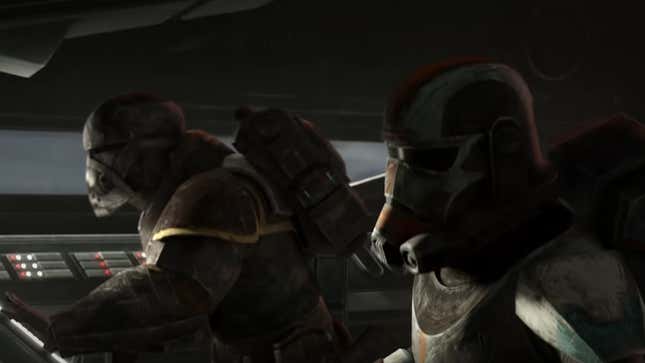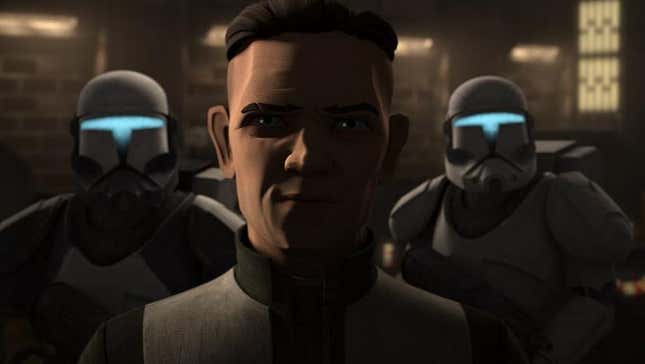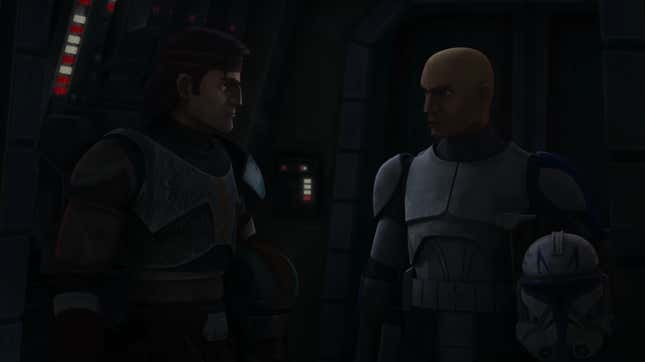Stop me if you’ve heard this before: the Bad Batch find themselves up against, and running away from, some kind of giant creature. “Why,” grunts Wrecker, the team’s beefy strongman as he huffs along, “why is there always a huge monster?” It’s a fun gag, because really, with The Bad Batch, there almost always is a huge monster. But it’s also an awkward truth of the show at large.
Bad Batch has struggled to find a balance between telling a variety of one-off stories of the week (like, say, the perpetual huge monster the ragtag clones always seem to find regardless of what their mission was) and a larger narrative with its titular heroes.
Advertisement

Advertisement
It’s why, for the most part, the series and its characters have largely felt stuck in place, even as the relentless Rise of the Empire encroaches further and further on the world and surviving characters of the Clone Wars—save for Omega (Michelle Ang) and conflicted team turncoat Crosshair (Dee Bradley Baker, perpetual voice of every Star Wars clone), the team hasn’t really grown in character beyond their initial introductions. It’s also why arguably the most interesting plotlines the series has developed so far—like seeing the young Hera Syndulla and the burgeoning re-emergence of Ryloth’s resistance groups in season one, or season two’s plotline about the lack of social welfare for Clones as the Empire turns towards its Stormtrooper program—have, by and large, not involved the Batch at all. The series has mostly kept its momentum restrained, content to only barely advance its world and characters as it distracts itself with another monster of the week.
Advertisement
All that changes in its third and final season—which returns today on Disney+ with a three-episode premiere, the first batch of 15 episodes—even though the huge monsters are definitely still there (in the first eight episodes, provided for review, there are at least five, depending on your hugeness threshold). Coalescing around the fallout of that three-part premiere, which itself focuses on the captured Omega and Crosshair as they reconnect and endure their separate lives in the underbelly of the Empire’s mysterious cloning research facility at Mount Tantiss, The Bad Batch’s final outing takes a more serialized approach than its predecessors, deftly drawing together plot elements that have built in fits and starts over the show so far. It’s been a long time coming, and occasionally to the show’s own frustration in the past, but even as season three moves on from one story to the next, everything feels like it’s coming together to focus on one particular endgame—one with potentially huge ramifications for both the characters we’ve come to know over the course of the show and the wider connective world of Star Wars in this tumultuous time period.

Advertisement
Everything matters here, and not simply in a quantifiable, wikiable “canon” way—it’s just that instead with this tight focus on its endgame drawing together myriad characters and stories at the nexus of Mount Tantiss and what the sinister Doctor Hemlock (Jimmi Simpson) has in store beneath its peaks, Bad Batch finally feels like it’s making effective use of the time it’s got. From the big monster action sequences, to character threads coming home to roost as the Batch reckons with the loss of Tech in season two’s climax while also dealing with the return of the lost members to its fold, season three spends its first half in service of starting to dig back into its characters in ways it rarely has so far, using the pressure cooker of its overarching scenario to really put the screws on its characters, and explore in what ways they really have changed in the long days since Order 66. Once again, this is in large part done most well through the lens of Omega and Crosshair, but this unlikely duo doesn’t just bring out the best in themselves but also draws that out in the rest of the crew, leading to some really satisfying moments of character work that feel like earned payoffs given how scattershot the series’ episodic nature has been in service of those characters in the past.
And while yes, there are some fun one-offs in these first eight episodes—a particular highlight sees Hunter and Wrecker begrudgingly team up with Fennec Shand (Ming-Na Wen) in a desperate bid for information—none of it feels necessarily “wasted,” in either distracting from the central plot or away from digging into its characters more, all weaving itself into this singular path towards Tantiss and Hemlock, again and again. It works, not just because it means we actually get to sit with our heroes and watch them develop and bounce off each other more, but because it effectively sets the stakes for the season at large as something that really matters—grand in the scheme of Star Wars itself, and The Bad Batch’s place in its timeline, but more crucially grand in terms of what matters to our heroes as people, especially.
Advertisement

Where the show has previously struggled to make its most interesting worldbuilding personally matter to the Batch, season three marries the personal and galactic stakes together perfectly, keeping everything compelling as it ticks over from week to week. It’s a reflection of a much stronger, more confident show, one that feels like it’s finally ready to nail down the story it wants to tell with its characters and is laser focused on doing so. Time will tell if the back half of the season will effectively pick up on the strengths of its front—but The Bad Batch has set a stage brimming with potential for an incredibly satisfying end to this chapter of Star Wars animation if it sticks the landing.
Advertisement
Star Wars: The Bad Batch’s third and final season begins streaming on Disney+ today, February 21, with a three-episode premiere.
Want more io9 news? Check out when to expect the latest Marvel, Star Wars, and Star Trek releases, what’s next for the DC Universe on film and TV, and everything you need to know about the future of Doctor Who.
Services Marketplace – Listings, Bookings & Reviews